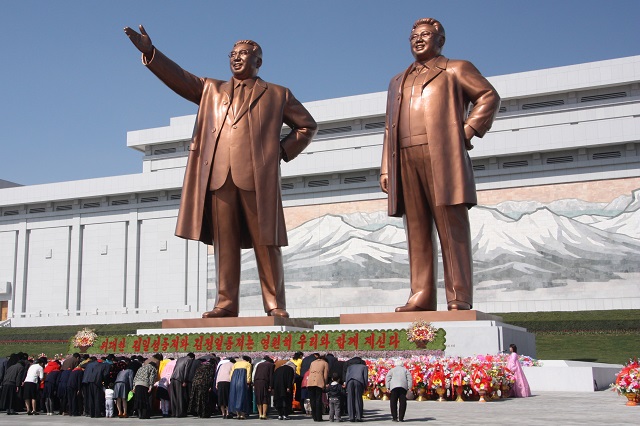North Korea: stronger Kim, but weaker Kims?

Finding a solution to North Korea’s accelerating nuclear and missile programs grows more urgent by the day. Our previous strategies—delay and denial—will no longer avail us. But the three standard options—diplomacy, sanctions or use of force—all have downsides. Diplomacy’s proven ineffective; sanctions are difficult, slow and uneven; and the use of force might well beget a wider war. Is there a sleeper option—regime change? In the wake of Iraq and Libya, regime change has a bad name. But the question’s worth revisiting, precisely because of the recent killing of Kim Jong-nam.
Kim Jong-il died in December 2011. Now, over five years later, we’re starting to get a clearer picture of what the successor regime looks like. It’s a regime run by a leader who’s both ruthless and insecure. Consecutive waves of purges have cut a swathe through North Korea’s elite, claiming the scalps of Kim Jong-un’s uncle and senior military leaders among many others. Kim Jong-nam is the latest victim of that effort. Part of Kim Jong-un’s insecurity seems to stem from his own familial circumstances. The middle child (of three children) from his father’s fourth common law wife, he probably believes that some of his brothers and sisters still favour a different distribution of their father’s estate. Such a belief would be far from unusual even in most normal families, and the Kim family is far from normal.
Kim Jong-un and his wife had a daughter, named Kim Jun-ae, in 2012. We know this from Kim Jong-un’s close friend, Dennis Rodman. It’s possible—not certain, but possible—that a son was born to the couple in late 2016. Ri Sol-ju, Kim Jong-un’s wife, spent several months out of the public eye. Rumours at the time suggested either a possible pregnancy or a falling out of favour between the wife and Kim Jong-un’s younger sister, Kim Yo-jong. By late October 2016, Ri Sol-ju had been out of the limelight so long that the British tabloid press had begun to speculate on her execution. She reappeared in public in early December—certainly not clutching a new-born babe, but that’s hardly surprising. Pyongyang’s not Buckingham Palace—it doesn’t announce the birth of an heir with fanfare and photographs.
If an heir was born in 2016, it would have underlined for Kim Jong-un just what a difficult path now lies before him. It will take the best part of three decades for him to settle the leadership on his son. If he were to die unexpectedly at some point during that period—from ill-health, misadventure, or a drone through his bedroom window—it would be hard to ensure the succession played out as he wished. In such circumstances, the ‘side branches’ of the family could prove a threat, not merely to his own rule, but to the future rule of his son. Kim Jong-un probably doesn’t worry too much about the second brother—Kim Jong-chol, devoid of progeny, remains so thoroughly hidden from public view that many people seem to have forgotten about him altogether. Media reports suggest he’s more interested in rock concerts than politics. Kim Jong-nam was a different matter though—he still had close links to China. And even Kim Jong-nam’s son, Kim Han-sol, born in 1995, might well be regarded as a plausible contender for the future leadership.
Kim Jong-un probably counts the death of his half-brother as a major victory, important in securing the future transfer of the leadership. True, Kim Han-sol is still alive, but has clearly fled with his mother and sister. Kim Jong-un’s problem, though—and it surely must have occurred to him by now—is that his actions have strengthened his personal position but disempowered the broader family. A Kim family that has fewer potential successors—and the preferred one still thirty years away (assuming that he has, in fact, already been born)—is more vulnerable to the slings and arrows of outrageous fortune than it was before. Indeed, the prospects for successfully displacing the Kim family from its monopoly on political power in North Korea are probably greater now than they’ve ever been. In short, we’ve entered a period in which we have a stronger Kim, but a weaker family of Kims.
That’s what now confronts those hoping to slow and, indeed, reverse the growth of North Korea’s nuclear and missile arsenal. Kim Jong-un’s hand is stronger, but he’s shrunk the leadership talent pool within the family, thereby diluting the prospects that someone from that pool can follow in his wake. (North Korea, remember, has never been ruled by someone from outside the family.) And in doing so, he’s made himself a more tempting target: it’s always easier to behead the snake than the hydra. So, we’re left with a teasing question: have Kim Jong-un’s actions increased or decreased the prospects for regime change in Pyongyang?